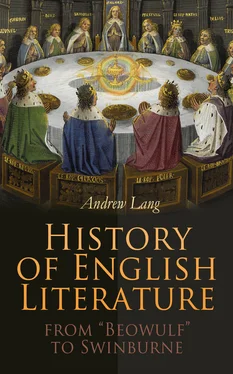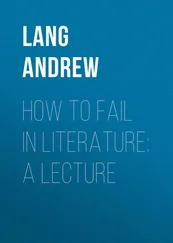1 ...8 9 10 12 13 14 ...40 In the school at Winchester Ælfric was trained (born 955?) and thence went to instruct the young monks in the abbey of Cerne in Dorset, where he preached homilies; he wrote them both in English and in Latin. His sermon on the "Holy Housel," that is the Holy Communion, contained ideas which the Protestants, at the Reformation, thought similar to their own, and they printed this homily. "All is to be understood spiritually." "It skills not to ask how it is done, but to believe firmly that done it is." The style of the prose is more or less alliterative, and a kind of rhythm is detected in some of the sermons, as if they were intended to be chanted.
The Latin grammars written by Ælfric do not concern English literature; his Dialogue ( Colloquium ) between a priest and a number of persons of various occupations, throws light on ways of living. He wrote Latin "Lives of Saints," and edited part of an English translation or paraphrase of the Bible, suitable as material for homilies. He produced many other theological works, and died about 102-(?) being Abbot of Eynsham in Oxfordshire.
The interest of Ælfric, Wulfstan, and the rest, for us, is that they upheld a standard of learning and of godly living, in evil times of fire and sword, and that English prose became a rather better literary instrument in their hands.
The "Leechdoms," and works on herb-lore and medicine of the period, partly derived from late Latin books, partly from popular charm songs, are merely curious; they are full of folk-lore. After the Conquest, Anglo-Saxon prose, save in the "Chronicle," was almost submerged, though, in poetry, there were doubtless plenty of popular ballads, for the most part lost or faintly traceable as translated into the Latin prose of some of the writers of history. There would be songs chanted among the country people about the deeds of Hereward the Wake and other popular heroes; minstrels, now poor wanderers, would sing in the farmhouses, and in the halls of the English squires, but not much of their compositions remains.
We have, however, a few famous brief passages of verse, like the poem of "The Grave," familiar through Longfellow's translation, and probably earlier than the Conquest. It is written on the margin of a book of sermons, and the author's mood is truly sepulchral. The "Rhymed Poem" is celebrated only because it is in rhyme, which was a novelty with a great future before it; it is older than 1046, its muse is that of moral reflection.
The one verse of a song of King Canute is handed down by a monkish chronicler who lived more than a century later. The king in a boat on the Ouse, near a church, bids his men row near the shore to hear the monks sing:—
Merie sungen the munaches binnen Ely,
Tha Cnut ching rew therby:
"Roweth cnihtes neer the land,
And here we thes munches sang."
This contains a kind of rhyme, or incomplete rhyme, of the vowel sounds only (assonance) in Ely, ther by , " land ", " sang. "
St. Godric (died 1170) also left a hymn to Our Lady, in rhymed couplets, with the music.
Of about the same period is a rhymed version of the Lord's Prayer; the number of syllables to each line varies much, as in Anglo-Saxon poetry, contrary to the rule in the poetry of France.
There are other examples all showing the untaught tendency of the songs of the people towards rhyme and towards measures unknown to the early Anglo-Saxons.
1.The Amazons appear to have been the armed priestesses of the Hittite empire in Asia Minor, about 1200 b.c.
CHAPTER IV.
AFTER THE NORMAN CONQUEST.
Table of Contents
At the time of the Norman Conquest (1066), the invaders possessed a literature in their own language, poems on the adventures of Charlemagne, and of Roland and the other peers and paladins. But perhaps none of the French poems on Charlemagne, or only one, the "Song of Roland," now exists in a form as early as the date of the Conquest, and they did not then reach the English people.
On the other hand the Norman clergy, many of whom obtained bishoprics and abbeys in England, were much more learned than they of England; and Lanfranc, the Conqueror's Archbishop of Canterbury, threatened to depose Wulfstan, the English Bishop of Worcester, for his ignorance of philosophy and literature. Yet Wulfstan excelled "in miracles and the gift of prophecy". Many new monasteries were founded by the Norman kings, homes of learning, each with its scriptorium (writers' room), in which new books were written, and old books were copied, almost all of them in Latin. St. Albans became a specially learned monastery and home of historians, while Roman law, medicine, and theology were closely studied, and books were lent out to students from the monastic libraries, a pledge of value being deposited by the borrower.
The books of the age which most interest us are the histories written in Latin, by various authors of known names, who often were not cloistered monks, but clergymen who lived much at court, and knew the men who were making history, kings and great nobles.
Of all of these authors the most important in the interests of literature, not of history, is Geoffrey of Monmouth, a Welshman, whose "History of the Kings of Britain" is really no veracious chronicle, but a romance pretending to be a history of Britain, especially of King Arthur. The name of Arthur spells romance, and Geoffrey's book is almost the first written source of all the poems and tales of Arthur which fill the literature of England and the Continent. But it is more convenient to discuss Geoffrey when we reach the age of the Arthurian romance.
It is not necessary to speak here of all the writers of Latin histories in the twelfth and thirteenth centuries. In the North were Simeon of Durham, and Richard, Prior of Hexham, who wrote "The Deeds of King Stephen," and Ailred, whose account of the defeat of David I of Scotland at the Battle of the Standard (1138) is very well told and full of spirit. In reading Ailred we find ourselves, as it were, among modern men: he speaks as a good English patriot, yet as a friend and admirer, in private life, of the invading Scottish king and prince. Florence of Worcester attempted a history of the world, compiled out of other books, called "Chronicon ex chronicis". The habit of "beginning at the beginning," namely with the creation, took hold of some of these historians, whose books are of little use till they reach their own times (if they live to do so), and speak of men and events known to themselves.
Eadmer, on the other hand, wrote of what he himself knew, a "History of Recent Times in England," down to 1122, and especially about the Archbishop of Canterbury, Anselm, and his dealings with William Rufus and Henry I (Henry Fairclerk, a patron of learning).
William of Malmesbury (1095?-1143?) like Geoffrey of Monmouth, was patronized by Robert, Earl of Gloucester, to whom they dedicated books. William understood, and said that there were two Arthurs, one a warrior of about 500-516 (?) the other a hero of fairy-land; but, as time went on, people began to confuse them, and to believe as historical the stories of Arthur which Geoffrey had written as a romance. William wrote the "History of the Kings of England," with several lives of saints and books on theology. The "History of the Kings" begins with the coming of the Anglo-Saxons, and ends in 1127, the reign of Henry; towards the close of its sequel, the "Historia Novella," his patron, Robert of Gloucester, an enemy of Stephen, is his hero. The book contains a history of the First Crusade.
William sometimes treats history in almost a modern way, he quotes his sources of information, chiefly Bede and the "Anglo-Saxon Chronicle". He refuses to vouch for the exact truth of events before his own time: he throws the responsibility on earlier authors, his authorities. Later, he speaks of what he has seen, or learned from trustworthy witnesses. When he reaches the time of the British resistance to the Anglo-Saxons, he mentions "warlike Arthur, of whom the Bretons fondly tell so many fables, even to the present day, a man worthy to be celebrated, not by idle tales, but by authentic history".
Читать дальше












